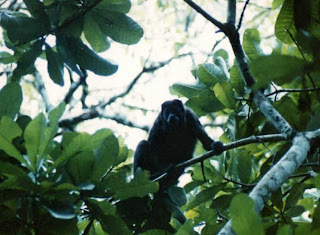I also volunteered for Earthwatch studying tropical rainforests and observed Black mantled howler monkeys (Alouatta paliatta) like the adult female below.
This was a great way to "get your feet wet". I explored Central America, lived with indigenous people, studied 6 species of primates and eventually started organizing international expeditions myself.
Along the way, I met some great people who assisted me with enhancing my scientific skills in research, orchestrating logistical details and people skills. In particular, I am grateful to have met Mr. Steve Rinder. At the time, Steve was working at Novack's in London, Ontario, Canada. When I told him about my desire to put together research/conservation expeditions to Panama to work on the tiny 33 hectare island of Isla Tigre on the Atlantic side of the Panama Canal he was estatic. He saw that I needed help organizing the program, so I hired him as a consultant. He opened my eyes to the world of ecotourism. He also introduced me to Dr. Jane Goodall as he knew I was fascinated by Chimpanzees. Steve was kind enough to write an article about his experiences with EARTHQUEST in Panama for Planeta.
If you're really interested in ecotourism or studying primates abroad try investigating these sites;
In April, 1999 I led an expedition into the Peruvian Amazon in search of primates, mammals and a newly formed ecological preserve called Curyiaco, located 300 kilometres in the interior from the rustic gold mining town of Puerto Maldonaldo. I was fortunate to recruit Mr. Sean Donovan on that team. Logistically, this riverboat excursion was very challenging. The troubles began when I mistakenly forgot my camera at the international airport in Lima, Peru. The airport authorities had to evacuate the premises because my camera was in a water proof Pelican case, which resembled something carrying a bomb. Sean was very helpful to me while on this trip, coming to my aid to assist with logistical details and alleviating the "bomb scare" for Peruvians.
Sean later signed up to my expedition to Nepal in late August, 2001 and was equally beneficial to the team and myself there.
I recently met Sean again after he spent more than a decade teaching English in Japan, where he met and married is lovely wife.
Since Nepal, I have trained or prepared hundreds of people in the biological sciences and for employment in the environmental industry. Many of which found fantastic jobs with environmental consulting firms, Conservation Authorities, provincial, federal government jobs and non-profit organizations.
I owe part of my success with building the careers of my students to people like Sean and Steve. Through Sean and Steve I have been motivated to assist people like Emily Thorne. Emily is currently looking for work in the environmental field. Tiffany Gilchrist took my GIS certification course and recently found employment with Stantec. As her first environmental consulting firm I felt Tiffany should be well informed about the pay range for consultants and presenting a professional resume to potential employers.
Other former EARTHQUEST Biological Field School students have been the source of a great deal of pride and satisfaction because they too have used their EARTHQUEST training to continue building their careers.
I am forever grateful and appreciative of all the help I've received over the years; through my struggles and successes. My hope is to continue to pay it forward. I would encourage and challenge you to find ways to pay it forward as well. It can be as simple as opening a door for a stranger, giving somebody a compliment, or contributing to your local food bank.
In my view, this is how we can all make the world a better place to live.
It is job hunting time, so if you need some help revamping your CV, how to apply to environmental jobs, how to handle interviews, etc. simply contact me or visit the EARTHQUEST website.
By: Dave Jolly


No comments:
Post a Comment